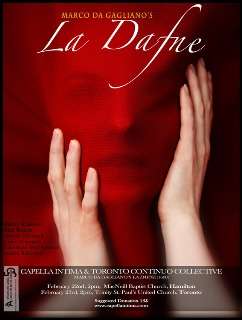|
Back
A captivating rarity Toronto
Trinity-St. Paul's Centre
02/23/2014 - & February 22 (Hamilton), 27 (Toronto) 2014
Marco da Gagliano: La Dafne
Capella Intima: Bud Roach (tenor, Apollo), Sheila Dietrich (soprano, Venere), Emily Klassen (soprano, Dafne), Luke Arnason (countertenor, Amore), Jonathan MacArthur (baritone, Tirsi), James Baldwin (tenor, Shepherd)
The Toronto Continuo Collective, Lucas Harris & Borys Medicky (directors)
Guillame Bernardi (diction and drama coach)

You can be forgiven if you have never heard of composer Marco da Gagliano. A Florentine, he lived from 1582 to 1643, during which time the opera came into being. Jacopo Peri’s La Dafne of 1597 is regarded as the first opera, and its music has sadly been lost. Its libretto, by Ottavio Rinucci, has survived and was set by da Gagliano in 1608 for the Gonzaga court in Mantua, just a year after Monteverdi’s landmark L’Orfeo.
Capella Intima is a small group of singers who, under director Bud Roach, seek out and intensively prepare works that other groups overlook. After coaching by Guillaume Bernardi, they have linked up with the Toronto Continuo Collective for this semi-staged presentation of the hour-long work. As was the practice of the composition’s era, the score consists of its vocal line and basso continuo line; instrumentalists were expected to improvise to provide ornamentation. There were passages written for two unspecified instruments; the co-directors of the orchestra (harpsichordist Borys Medicky and lutenist Lucas Harris) played those notes with the rest of the group playing the continuo line. The result is a deluxe continuo with seven players in addition to Medicky and Harris: four theorbos, an archlute, a baroque guitar and a bass viol, the only bowed instrument. The sonic result of this “pluck band” is music that warmly ripples along, providing strong but never overwhelming support for the voices.
In his preliminary remarks, Bud Roach mentioned that the work is part of the “birth pangs” of opera. The singing is all recitative-like, although there are stretches that can almost be classed as arias. The most “primitive” aspect of the work is that all the action is also described in narration - thus it comes across as more like a dramatic cantata.
After a brief orchestral introduction (borrowed from another da Gagliano work), there is a prologue during which the singers recount the theme of the tale (from Ovid’s Metamorphoses) about dangers in the power of love. A community of nymphs and shepherds find themselves menaced by a monster; the god Apollo descends and kills it. He returns to Olympus in a boastful mood and insults Amore (Cupid) whose tiny arrows could never so such a mighty job. Amore, urged on by his mother Venere (Venus), vows vengeance: he will make Apollo fall hopelessly in love with a woman who Amore will render indifferent. This turns out to be the huntress Daphne; she flees in alarm from the ardent Apollo and is turned into the laurel tree. Apollo is devastated and proclaims that the laurel shall be henceforth the symbol of distinction.
Sections that can almost be termed arias are Amore’s vowing to revenge Apollo’s insults and Dafne’s praise of Apollo when she is told of his killing of the monster. The character Tirsi, ably performed by youthful baritone Jonathan MacArthur, has the longest and most dramatic narration when he recounts the fate of Dafne. The lament became a staple item in music of the era and here there are two: one for Apollo and Tirsi after Dafne’s transformation, and then one sung by Apollo alone.
All six singers are well up to the mark as far as vocal style and expressiveness are concerned. One associates performance of such early works with dry voices but such is not the case here. They do double duty in their solo roles - presenting fully developed characterizations - and as the group of nymphs and shepherds.
Much to my surprise, there are at least four recordings of this work, although I am sure it is best appreciated in live performance (especially when as well prepared as this one). Previous to this performance (in the supportive acoustics of Toronto’s Trinity-St. Paul Centre) it was performed at MacNeill Baptist Church in Hamilton, Ontario. Toronto audiences have a second chance to see it (for free!) at the Richard Bradshaw Amphitheatre at the Four Seasons Centre at noon on Feb 27. Highly recommended!
Michael Johnson
|